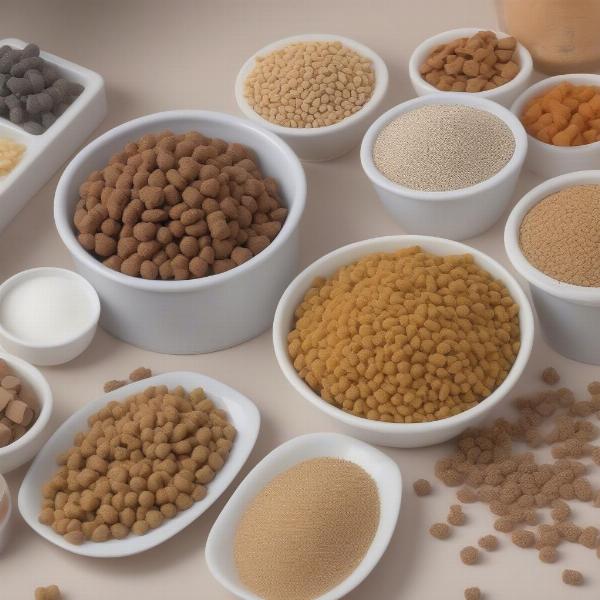K9 food for dogs encompasses a wide range of dietary options, from kibble and canned food to raw diets and homemade meals. Choosing the right k9 food is crucial for your dog’s overall health and well-being. This guide will delve into the various aspects of k9 food, helping you make informed decisions about your furry friend’s nutrition. We’ll cover everything from understanding your dog’s specific needs to deciphering ingredient lists and navigating the world of commercial dog food brands.
Deciphering the Ingredients in K9 Food
Understanding dog food labels can be daunting. Look for whole meat sources as the primary ingredients, such as chicken, beef, lamb, or fish. Avoid by-products, fillers, and artificial additives. Ingredients are listed in descending order by weight, so the first few ingredients indicate the main components of the food.
Choosing the Right K9 Food for Your Dog’s Life Stage
Different life stages require different nutritional profiles. Puppies need food rich in protein and calories to support their rapid growth, while senior dogs benefit from lower-calorie diets with added joint support supplements. Adult dogs require a balanced diet tailored to their activity level and breed size.
K9 Food for Specific Needs: Allergies, Weight Management, and More
Many dogs have specific dietary needs due to allergies, sensitivities, or health conditions. If your dog has allergies, look for hypoallergenic k9 food formulated with limited ingredients or novel protein sources. For overweight dogs, choose low-calorie, high-fiber options. Always consult your veterinarian before switching your dog’s diet, especially if they have a pre-existing health condition.
 Tailored K9 Nutrition for Specific Needs
Tailored K9 Nutrition for Specific Needs
Raw vs. Kibble: Navigating the K9 Food Debate
The debate between raw and kibble continues. Raw diets offer potential benefits like improved coat health and higher energy levels. However, they also carry the risk of bacterial contamination and nutritional imbalances if not prepared carefully. Kibble is convenient and offers complete and balanced nutrition when chosen wisely. k9 raw dog food offers more details on this diet choice.
Is “K9 Food” Just a Marketing Term?
While “K9” often refers to police or military dogs, the term “k9 food” has become a general term for dog food. There isn’t a specific category of food exclusively labeled “K9.” Essentially, high-quality dog food, regardless of the branding, can be considered appropriate for a K9.
Conclusion
Choosing the best k9 food for dogs involves understanding your dog’s individual needs, reading labels carefully, and consulting with your veterinarian. By prioritizing quality ingredients, appropriate life-stage formulas, and addressing any specific dietary requirements, you can ensure your canine companion receives the optimal nutrition they need to thrive. For larger breeds, check out our article on big dog k9.
FAQ
- What is the best k9 food for puppies? Puppy food should be high in protein and calories to support growth.
- Should I feed my dog raw food? Discuss the risks and benefits of raw feeding with your vet before making a decision.
- What is the difference between “k9 food” and regular dog food? “K9 food” is often used as a general term for dog food.
- How can I tell if my dog has food allergies? Look for symptoms like itching, skin irritation, and digestive issues.
- How often should I feed my dog? Feeding frequency depends on your dog’s age, breed, and activity level.
You Might Also Like
ILM Dog is your trusted global resource for expert advice on dog care and breeding. We offer comprehensive information on dog breeds, health, training, nutrition, grooming, and much more. Whether you’re a new dog owner or a seasoned expert, ILM Dog provides practical and reliable guidance to help you provide the best possible care for your canine companion. Contact us at [email protected] or +44 20-3965-8624. Visit us at ILM Dog for more information.